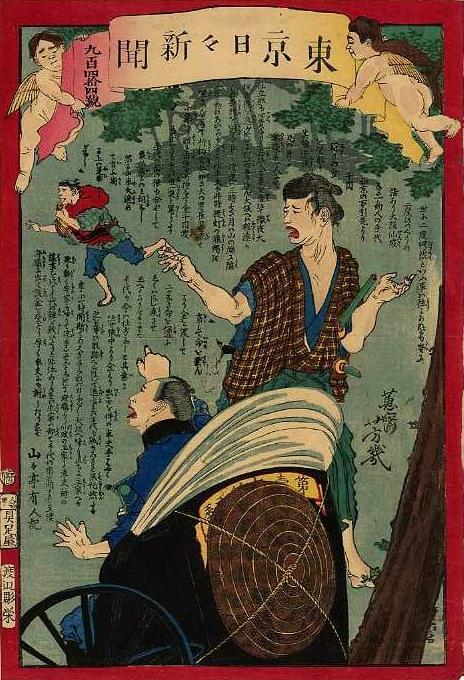Commentary
The translation would read a bit faster if rendered more freely, with less regard for illuminating the structures of the original text. Still, the storyteller's craft -- his ability to create just the right ambiance while unfolding the narrative at just the right pace -- is clearly evident.
Notes
agent (手代 tedai) was someone who worked for, was trusted by, and represented a proprietor or manager of a shop, or other person, in financial transactions and other matters.
Senba (仙坡) is now part of Chuo ward in Osaka city.
Saikyo (西京 Saikyō) -- meaning "western capital", as opposed to "eastern capital" (東京 Tōkyō Teikyō) -- was a fairly common reference to Kyoto (京都 Kōto).
a man of great size who seems to pierce the clouds reflects 雲突如き大の男 (kumo tsuku gotoki dai no otoko) -- a cliche more familiar today as 雲つくばかりの大男 (kumotsuku bakari no oo-otoku) or 雲を衝つくような大男 (kumo o tsuku yō na oo-otoko), which most translators reduce to "a [towering] giant of a man".
the roots of his teeth not meeting reflects 歯の根も合ずして (na no ne mo awazushite) -- a cliche meaning "his teeth chattering" he was so frightened.
For [in the past] there was [the saying], Do what will benefit you. reflects 疾させ玉へとありけるにぞ (toku sasetamae to arikeru ni zo). The general expression is "toku suru" (得する). The polite imperative of "suru" is "sasetamae" (させ給え).
The expression in the story would generally be graphed 得させ給え rather than 疾させ玉へ.
疾 is glossed とく -- as in the phrase 疾に (toku ni), which has the variations 疾っくに (tokku ni) and 疾に (tou ni) and means "in the past" -- thus alluding to 得 (toku) while also link with ありける (arikeru), meaning "there was [in the past]".
玉 is not glossed but was commonly used to represent the "tama" of 給う (tamau) or 給え (tamae). The graph 玉 (Japanese "tama", Sin-Japanese "gyoku") means "jewel" or "gem".
crying -- As [things] should not have been like this, [I] had no power reflects 斯てあるべきならねバ力なくなく (kakute aru beki naraneba chikara nakunaku). The main phrase, a double negative, means something like "Things being as they were, I had to do what I did".
"crying" reflects "naku naku" ( なくなく) or "cry, cry" (泣く泣く naku naku) -- i.e., "while crying" (泣きながら nakinagara). It is commonly linked with a negative phrase, as here -- "chikara naku" (力なく chikara naku), meaning "without power".
master's house (主家 shuka) means not only the place where a master (主人 shujin) lived but the "house" as a family or corporate entity. Similarly, own house (実家 jikka) refers to both the place and the entity of one's own (typically natal) home as opposed to "another house" (他家 take).
master and servant reflects (主僕 shuboku), which I have taken to mean the master and agent.
